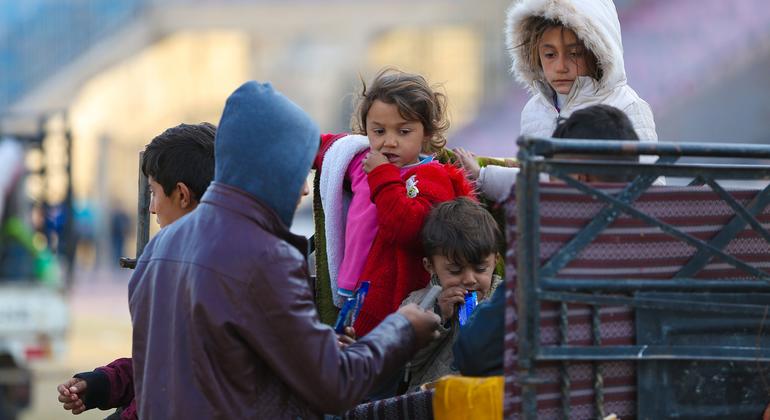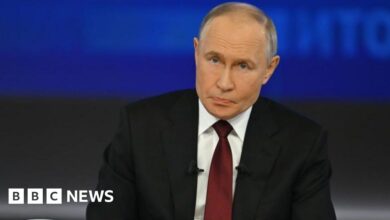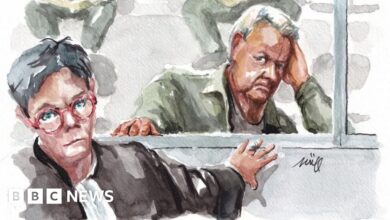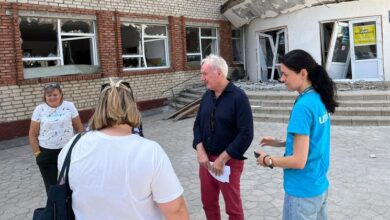Syria faces an uncertain future after the regime collapsed due to a humanitarian crisis

Special Envoy for Syria Geir Pedersen and Emergency Relief Coordinator Tom Fletcher briefed ambassadors via video link from Damascus, where they are working with key stakeholders to resolve the issue. increased support from the United Nations and promote one comprehensive and credible political transformation.
They emphasized that while the current moment offers a rare opportunity for peace and reconstruction, it is also fraught with risks.
An important moment
Mr. Pedersen described the tragic end of the 54-year Assad regime as a pivotal moment for the country and its people. He emphasized the need for careful management by both Syrians and the international community.
“The Syrian people have a deep and shared sentiment that this new situation belongs to them, that this is the time for them to realize their legitimate aspirations.he said.
“But many people are scared about the future. The challenges ahead are huge.”
He told Council members that the regime’s collapse came after rapid advances by the Military Operations Command, an armed coalition led by Hayat Tahrir al-Sham (HTS). An interim authority, composed of officials from the self-proclaimed Syrian National Salvation Government, took power.
Competing for regional power
Mr. Pedersen also emphasized that tensions continue across Syria, where armed opposition groups and regional power struggles threaten to destabilize.
Northeast Syria, including some areas surrounding Aleppo, remains under the control of the US-supported Syrian Democratic Forces (SDF). A five-day ceasefire brokered by the US and Türkiye along the Euphrates River has expired, with reports of a military buildup and rising tensions.
“Such an escalation could be disastrous,” he warned.
Situation in the Golan
Adding to the instability, in southwestern Syria, the United Nations peacekeeping mission, UNDOF, observed the Israel Defense Forces (IDF) at multiple locations in the divided region.
The Israeli military has advanced several kilometers into Syrian territory according to multiple media reports and there have been hundreds of airstrikes on military installations, equipment and supplies across Syria, which Israel describes as a defensive measure.
“Such attacks put vulnerable civilians at greater risk and undermine the prospects of an orderly political transition.Mr. Pedersen said, citing reports of Israeli settlement expansion plans in the Golan.
“Israel must cease all settlement activity in the occupied Syrian Golan Heights, which is illegal. Attacks on territorial integrity must stop”, he emphasized.
Preserving Syria’s institutions
Mr. Pedersen outlined Syria’s three main challenges: ongoing hostilities, enormous economic and humanitarian needs, and the need for a credible political transition.
He emphasized the importance of preserving state institutions, establishing an inclusive governance process and ensuring free and fair elections – all key components of Security Council resolution 2254 (2015).
“Stability will not last long if it is not built on a reliable and comprehensive foundation. Now is the time to build those foundations,” he said.

Tom Fletcher (on screen), UN Under-Secretary-General for Humanitarian Affairs, summarizes the Security Council meeting on the situation in Syria.
The humanitarian needs are staggering
UN emergency relief coordinator Tom Fletcher echoed these concerns, highlighting the staggering humanitarian toll of the long-running conflict, compounded by recent upheavals.
Even before recent tragic events, Syria was home to one of the world’s largest humanitarian crises, with more than 17 million people – or 70% of the population – in need of assistance.
“The recent escalation has only increased these demands”, reported Fletcher. More than a million Syrians have been displaced in less than two weeks, while hundreds of civilians, including at least 80 children, have been killed or injured.
Essential services, already depleted by years of conflict, have stalled, and schools, health facilities and aid operations have deteriorated. There are also reports of severe shortages of food, fuel and supplies due to disrupted trade routes and border closures.
To ease the situation, he has pushed to increase aid efforts on a large scale, he said, adding that the caretaker regime in Damascus has pledged to facilitate the transport of personnel. navigating across conflicting boundaries and borders.
Capital needed
In addition, resources are needed to finance relief operations. The 2024 humanitarian appeal for Syria is one of the most poorly supported, receiving less than a third of requests and with just two weeks remaining.
For its part, the United Nations has allocated $32 million from its funding sources. Central emergency response fund (CERF) to support vital, life-saving humanitarian work.
Mr. Fletcher called on the international community to follow suit.
“Now is the time to invest in the Syrian people, supporting flexible funds so we can meet changing needs…now is also the time for Member States to step up development assistance efforts to rebuild Syria, reducing dependence on humanitarian assistance; and maintain essential services.”




